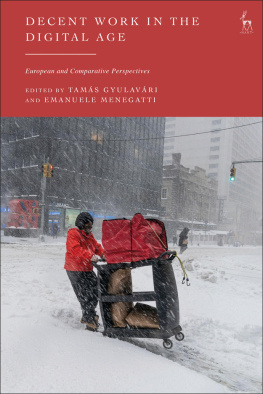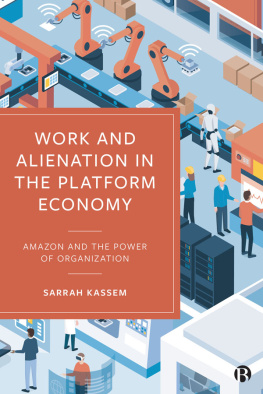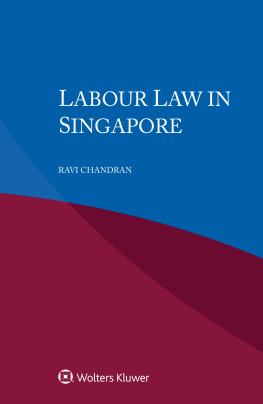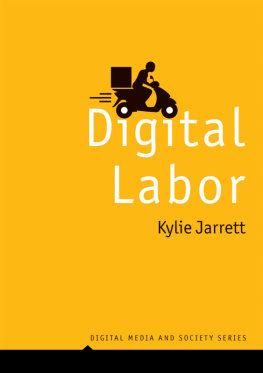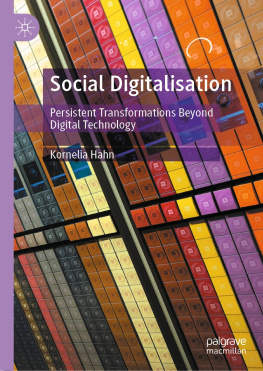CONTENTS

DECENT WORK IN THE DIGITAL AGE
This book explores the legal and practical implications of the digital age for employment and industrial relations. To that end, the book analyses the problems arising from the digitalisation of work and the negative effects on working conditions in fields such as platform work, robotisation, discrimination, data protection and freedom of speech. It also looks at how to ensure decent working conditions for workers affected by digitalisation, by investigating the minimum standards that should be ensured to mitigate negative effects and how these could be best guaranteed by legislation and collective bargaining.
The book presents a theoretical framework on the impact of automatisation, robotics, and digitalisation on the very basic principles of individual and collective labour law. The chapters provide an in-depth analysis of new patterns of work prompted by digitalisation, including: classification of platform workers; recognition of employment and social security rights; competition law aspects of platform work; remote (tele)work arrangements; algorithmic decision-making and remote surveillance; data protection and privacy; and social media in working environments.
The book is an important reference for academics and researchers, social partners, and policy makers with an interest in labour law and industrial relations.
Decent Work in the Digital Age
European and Comparative Perspectives
Edited by
Tams Gyulavri
and
Emanuele Menegatti

This is an exciting collection of essays on a challenging topic. Digitalisation of working lives has accelerated and, as labour lawyers, we now find ourselves reflecting on the consequences. As the editors of this remarkable volume observe, emerging technologies and their diverse consequences for work are prompting the re-evaluation of what seemed to be previously successful regulatory strategies and their merits in a rapidly innovating sphere of the labour market.
The editors present these concerns in a European and comparative frame, which is likely to have global relevance. It is hard to find many countries that have not been affected by various different kinds of platform work and digital outsourcing. What the European Union provides is a framework for transnational debate and an experimental regulatory forum from which other states and policy actors can learn, perhaps as much from any missteps as successes.
This volume begins by posing fundamental questions about how we view regulation of work in a digital age. Manfred Weiss asks questions regarding the basic principles of labour law and the extent to which these can be applied in a new contextual matrix of digitalisation. He presents the potential tensions, given the emergence of new forms of precarious non-standard work, and the challenges to be overcome to avoid a recommodification of labour. These are ably set out in this book in addresses the data protection and privacy concerns associated with digitisation of work. In a short Foreword, it is difficult to do justice to the rigour and complexity of the arguments presented by all the contributions presented in each part. Suffice to say that, throughout the volume, they pose various difficult questions, which are worth highlighting here.
For example, at what level of generality can regulation be made, so as to capture not only recent innovations but future technological innovations, which at present can be only scarcely envisaged? After all, we are embarking on a creative enterprise to craft appropriate solutions to new problems that will not merely pause at this point, Is rapid adoption and review of specific legal instruments, such as new laws aimed at particular forms of platform work or algorithmic management, preferable to norms set at a broader level of generality that might encompass ongoing accelerated change? And could the latter even be achievable?
Can we future-proof labour law when, as EP Thompson observed, mechanical change once transformed notions of working time, as does now the use of social media and the internet today. With acceleration in changed working demands, regarding tasks and hours, and perhaps training and know-how, including new issues of confidentiality and fidelity, how does law recognise such transformations?
Further issues also arise. Digitalisation offers, ironically, a return to home-based working or even working almost anywhere, As such, when we seek to promote Decent Work in the Digital Age, it may become necessary to look beyond the safety and health not only of the workplace as constructed and managed by an employer, but also to broader environmental concerns which affect where and how we work. This, in turn, raises broader questions regarding the substantive values that inform labour law.
In the construction of future ongoing regulation of digitalisation, how do we maintain a principled approach, or as Ruth Dukes would have it, a Labour Constitution reflecting values other than merely the law of the labour market?
Given the conflict likely to ensue between different interests over the normative objectives and their manifestation in legal forms, who is to make such decisions? What scope is to be given to managerial prerogative (enabling discretion based on perception of commercial needs) versus collective bargaining exercised through worker representatives (enabling workers interests to enter the frame)? In this context, the exploration by Edoardo Ales in this volume of the impact of automation and robotics on collective labour relations is most welcome, as is the careful reflection by Jeremias Adams-Prassl on both individual and collective aspects of management by algorithm, and the exploration by Tams Gyulavri of collective labour rights amongst a wider floor of rights.
The resolution of such tensions may fall to be decided at first instance by the state legislature and the courts in any given nation state. Yet, one might wonder also what scope would there be for regulating the terms of regional and global competition between nations? For this reason, the insights of Iacopo Senatori on EU law and digitalisation of employment relations are also most welcome. Here we can look to the simultaneous issue by the European Commission of a proposal for a Platform Worker Directive, Yet, we may also wish to consider higher level coordinated regulation through the International Labour Organization or a broader species of multifaceted global law, as Frank Hendrickx suggests in this collection.
Last, but certainly not least, this impressive collection of essays directs us towards considering regulation of working life in the digital age, not only with reference to the traditional field of labour law, but in other spheres of law which can secure decent work. It has been acknowledged for some considerable time that the wellbeing of workers is shaped by other legal disciplines, such as company law. of this volume, the contributors offer analysis of data protection law and of course human rights law relating to privacy, all of which are highly relevant to work in a digital age. Also, earlier in the book we find other helpful intersections, when the significance of competition law is interrogated by Tihamr Tth and the importance of social welfare law is highlighted by Marius Olivier.
This may not be a book that pretends to offer neat or straightforward solutions to the taxing problems posed by the digital present and future of work. However, it will provide a vital reference point for those exploring regulatory possibilities and considering their implications. The editors are to be congratulated, as are all the contributors.

